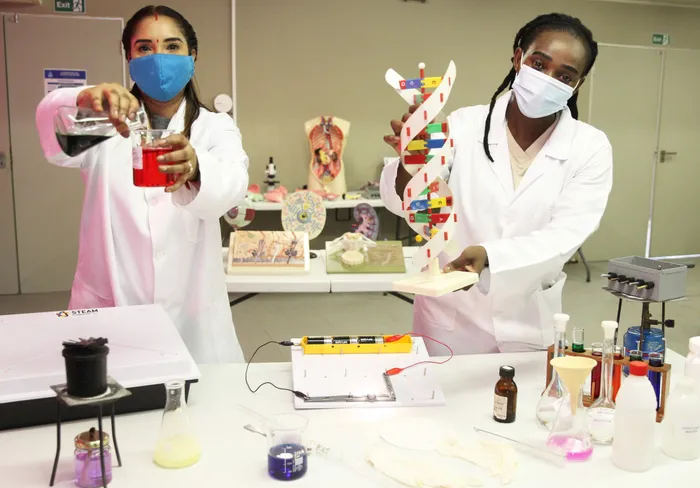National Science Week launch a resounding success as students urge to take up STEM opportunities

Girls in science. Picture by Doctor Ngcobo.
Johannesburg - The 2023 National Science Week (NSW) had a successful launch at the University of Venda, Limpopo, at the weekend. Not only did the dreary weather do little to deter the exposure of about a thousand school learners to the latest scientific developments on exhibition, but the event also proceeded smoothly.
Themed “Building a culture of evidence-based practice”, this year’s event will run from July 31 to August 5 with activities intended to expose learners to science and encourage them to take up science, technology, engineering, and mathematics (STEM) held across South Africa.
The South African Agency for Science and Technology Advancement (NRF-SAASTA) is the main co-ordinator of this initiative which has been a hallmark of science communication since 2000.
In his key address, Dr Blade Nzimande, the Minister of Higher Education, Science and Innovation, said the National Science Week is held “as part of our efforts to contribute to the development of a society that is knowledgeable about science and which engages critically on science, technology and innovation”.
“This year, NRF-SAASTA, a unit of the National Research Foundation, will continue to award grants to various organisations – public, private and non-governmental – that will carry out activities to popularise science across South Africa, and promote science literacy. I, therefore, want to make a call to all our learners that no one should be left out of the solution-driven national discourse that speaks to the value of science in our lives and for our future.”
The minister urged principals and teachers to ensure that more learners take part in science, technology, engineering, mathematics and innovation (STEMI) olympiads and exhibitions that will be held during National Science Week.
“The NSW should serve as a reminder to schools to encourage learners to take up mathematics and science,” he added. “Research indicates that STEMI olympiads and fairs are useful in developing problem-solving, creative, computational, communication, and innovation skills, which are among the those that are important for the future of work.
“It is also counter-productive to discourage learners from choosing mathematics, as some school principals are doing, thinking that it is the best way for their schools to produce better results by avoiding the purported difficult mathematics altogether. Let the National Science Week be a turning point. Make sure that on each day from July 31 to August 5, 2023, there is at least one fun science experiment that every classroom in your school engages. There are many such experiments available on the internet.”
Dr Bernard Nthambeleni, the Vice-Chancellor and Principal of the University of Venda, hailed the National Science Week initiative and concept as important to raising awareness about science and all that it has to offer.
“The University of Venda is cognisant that the primary goal of the National Science Week campaign is, among others, to make science accessible and exciting, engaging and encouraging to learners to embrace science and its application in our daily lives and foster the culture of scientific curiosity and discovery for our nation,” he said.
Dowelani Nenguda, Vhembe District Municipality Executive Mayor, said: “We now all know that technology is a driving force of our economy and as a country we’re aligning accordingly to ensure that our children are (conscious of) the current innovations. We’ve always preached about the Fourth Industrial Revolution (4IR) that is coming to expedite and change how we do things. It is no longer a far-fetched phenomenon. It is a reality that has dawned and needs all of us to embrace. We appreciate that our children, who in the majority are from poor and disadvantaged backgrounds, will get an opportunity to celebrate this very special week. They will celebrate it with an understanding of what science is about and how they can contribute to change the world.”
Related Topics: